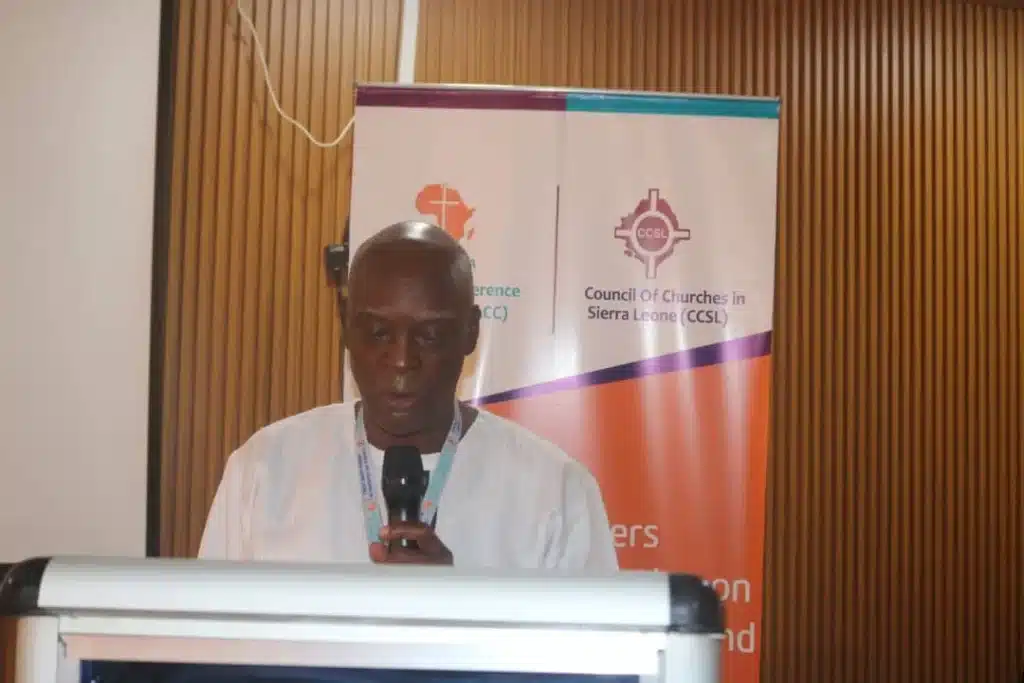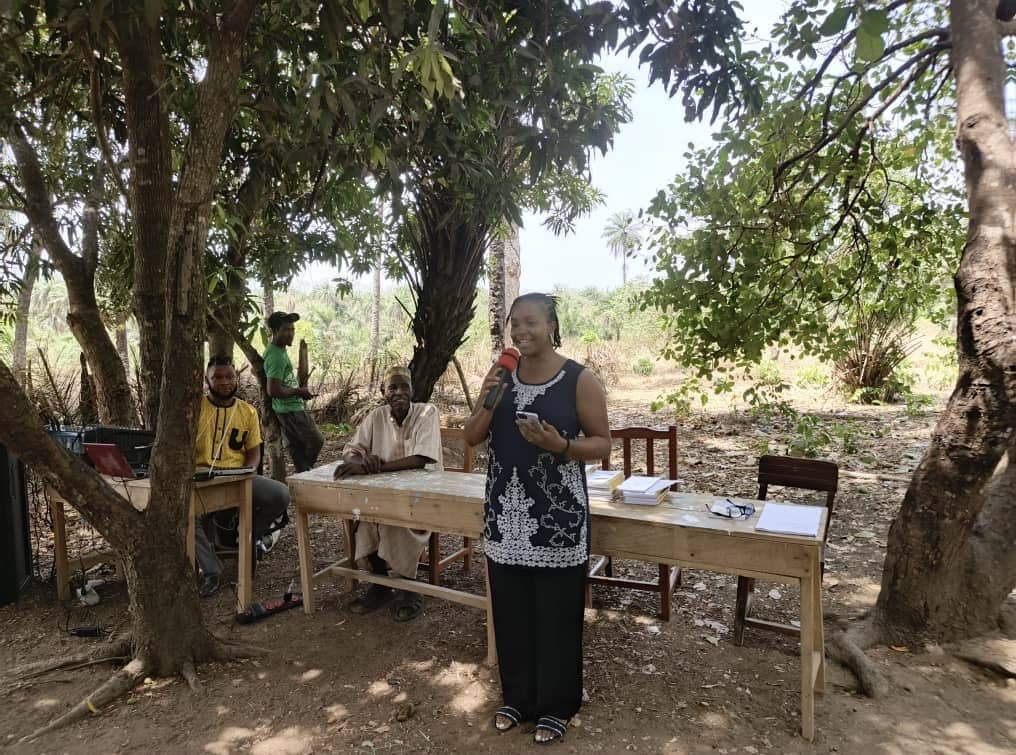Schools for Angolan Young Women
Angola
Click here to see the latest update!
The Evangelical Congregational Church in Angola (IECA) is a longstanding partner of Global Ministries, founded in 1880. Since its beginnings, IECA is committed to be an agent of change, prioritizing social development. Improvements have been made in the lives of many people through projects of rehabilitation, education, training, literacy, health, peace, and reconciliation.
Angola was ravaged by a 27-year civil war, which devastated its people. The church’s commitment to peace and reconciliation was in the forefront in the post-war days. Many of Angola’s people still suffer from extreme poverty, malnutrition, disease, and hunger. There is a lack of hospitals and schools. Many rural Angolans fled to the coast, the “bush,” or to refugee camps during the war. Life was very harsh there, and void of education and tolerable living conditions. Basic skills and life preparation training were nearly lost to two generations of Angolans.
After the war, people returning to their farms, villages, and cities were mainly women and children. Areas greatly affected by the war, including where the IECA church is strong today, are predominantly women and children, many of whom need education and a ways to generate income.olans fled to the coast, the “bush,” or to refugee camps during the war. Life was very harsh there, and void of education and tolerable living conditions.
The Dille/Dunbar Fund for Schools for Angolan Young Women was established with Global Ministries in 2002 by siblings Thomas Dille and Nancy Dunbar and their spouses, after an extended trip to Angola, during which they visited church communities in urban and rural areas as well as places from their childhood. Nancy and Tom grew up in Angola as the children of missionaries, the late Carl and Lois Dille. The Dilles and Dunbars worked with Global Ministries and with IECA and its Department of Social Assistance Studies and Projects (DASEP) to establish or reinforce existing rural schools for young Angolan women in the communities of Benguela, Camundongo, Chilesso, Huambo and Lobito. The schools in Chelesso and Camundongo were built and implemented almost entirely with support of the Dille/Dunbar Fund.
The purpose of the schools is to provide a place and help establish a curriculum that bridges the gap in education and life skills lost during the 27 year civil war which took place primarily in the rural regions of the country and for today’s young Angolan women.
The Dille/Dunbar Fund for Schools for Angolan Young Women has achieved its original goal of supporting these schools, which are government-approved in these towns and rural areas. Literacy, nutrition, health, sewing, agriculture, human rights, and small business operation are taught in all schools to varying degrees. When possible, computer training, bookkeeping and English are added to the programs.
In late 2014 the Dilles and Dunbars made a trip to Angola to visit the schools and interview educators, students and IECA church leaders. Upon consultation with them and with Global Ministries, the focus of the Dille/Dunbar fund will center on the following needs for the next period 2015-2016:
CHILESSO
Since last report on the Chilesso School, the assembly room, classrooms, and offices are in good condition. Extensive repairs due to rain damage have been completed, floor tiles have been installed, restrooms built, and a space constructed for a kitchen. Two cycles of three-month classes have been held for young women, ages 17-20 recently. It is hoped that a literacy session can be added. The current curriculum also includes cooking, laundry, hygiene, nutrition, and knitting. Of special note is the fact that older women would like to attend the classes as they missed out on training of this sort during the civil war.
Recently enrollment at the Chilesso School has fallen off due to various factors. The leadership at Chilesso feels that better dormitory facilities are needed to attract more girls to participate; there are presently only five girls in residence. Other concerns are a lack of supplies and food for the students. A major rehabilitation of the women’s dormitory is now in process, supported by the Dille/Dunbar Fund through Global Ministries. The estimated cost for completion, including four restrooms, is $40,000.
CAMUNDONGO
The handsome former Escola Domestica has been rebuilt with careful attention to detail. The Camundongo Women’s School opened in 2011 and the students say their classes make a big difference in their quality of life. The school still needs some finishing work which should cost about $2,500. The facility includes two classrooms, a kitchen area without equipment, two offices, a sitting room, three restrooms, and a dormitory room to be used by teachers.
Literacy is the primary focus at the Camundongo School. As in all instruction, teaching is difficult due to lack of books and supplies. For that reason an enrollment of 56 men and women at one time in literacy has been reduced to 8 persons. Vital instruction programs for women were begun before 2004 without a building and included cooking, raising crops for the school, citizenship, and knitting. Students from those years were very enthusiastic and inspired younger women and the school hopes to reach that level of participation and enthusiasm once again.
There are no boarding students among the small enrollment due to the lack of food, supplies, and accommodation for the students. A severe shortage of teachers is a problem at Camundongo which shows no sign of improving. There is need for supplies for all instruction but especially literacy.
Despite ongoing obstacles the teachers wish to continue and hope others can be trained to keep the school going.
In cases of all of the five schools, resources are needed to provide continuing education and training opportunities for the teachers.
As stated, the original objectives of the Dille/Dunbar Fund have been met. Now the emphasis is to fill some remaining and current needs:
- Renewal of the dormitory at Chilesso
- Finishings for the Camundongo School building
- Supplies and books for Chilesso and Camundongo schools
- Continuing education and training opportunities for teachers
Update: March 2016
In 2015, the Schools for Young Women in Angola of the Evangelical Congregational Church in Angola (IECA) were excited to complete several capital improvements and hold successful community programs. Since the last report provided for Camundongo and Chilesso schools, IECA’s Department of Social Assistance, Studies, and Projects (DASEP) laid floors in six rooms of the Girls Dormitory; interior and exterior walls were painted, improvements to the electrical installation were made, construction of washing rooms were completed, and the construction of the kitchen was started. These improvements will provide better living spaces for teachers and trainers, a better environment for the classrooms and studying, and improved access and maintenance of training materials and equipment.
In addition to the improvements to the schools in Camundongo and Chilesso Schools, the Evangelical Congregational Church in Angola was proactive in its belief that an important component of increasing the education of young women in Angola is to raise awareness among communities on the importance of young women receiving an education. DASEP held six workshops across Angola to discuss the value of young women’s training for the future. Over 300 individuals attended these workshops in the communities of Sambundi, Muembessi, Santa Rosa, and Hambandi.
In 2016, the IECA Schools for Young Women in Angola would like to increase the number of students they are able to teach. In order to accomplish this, the schools are planning to complete the construction of the kitchen, and to furnish the dormitories with beds and sheets. This will provide the space for residential students, and provide necessary improvements to begin accepting more students.
Update: October 2016
This year, the schools at the Camundongo and Chilesso Missions provided a total of 94 students with practical education in Biblical literacy, basic reading and writing skills, home economics, and agriculture, as well as occupational skills like sewing, knitting, catering, pastry-making, decorating, and tailoring. While most of the students were women and girls, 23 male students joined the pre-marital courses at Chilesso. In July, another cohort of 42 women gathered for classes at Chilesso and is expected to graduate at the end of October.
The women at both Camundongo and Chilesso have been able to contribute to the funding of the schools through the sale of their produce, knitted items, and decorative crafts. These funds have contributed to begin new, small projects in the community and are ripe for growth. The women plan to attend provincial trade fairs next year to not only sell more of their products, but also to spread the word about the schools. Through the funds raised, they plan to provide partial support for the growing agricultural program.
The agricultural program has received positive feedback from students and significant interest for future courses. Not only did the program provide skills in conservation agriculture, but it also produced enough yield to improve the food security of students and their families. The IECA has also been able to use some of the produce to provide nutritional foods for community members. There is so much interest in future courses that the program will need additional materials and support in order to meet demand. The Chilesso Mission has also embarked on a coffee project with the support of a local non-governmental organization AAD (Angolan Action for Development) based in Kwanza Sul Province.
Many of the students have expressed interest in sewing classes that both missions would like to purchase more machines. Additional teaching materials such as pens, pencils, and notebooks are always in demand. The increased interest in agricultural courses has generated a need for more hoes, rakes, and seeds to support additional classes and fields. Now that the schools are graduating a significant number of students, they need computers to process paperwork and graduation materials.
To grow the programs and to maintain the current facilities, the IECA is raising an additional $22,000. Roughly 20% of these funds will be used for maintenance and repairs, such as repairing broken or weakened water sources, repainting the schools, and improving electricity functions. The remaining funds will be used to respond to the growth of both schools, such as the additional teaching materials, additional equipment for agricultural courses, computers, and sewing machines. Through expanded programming, the missions will be able to support more families in achieving food security and developing useful occupational skills. Global Ministries welcomes gifts in support of the IECA Schools for Angolan Young Women.
IECA Trainings on Peace Building and Conflict Resolution
In addition to supporting community development through occupational skills and food security, the IECA educates and trains men and women on peace building and conflict resolution. The church has embarked on various initiatives, namely addressing Sexually Based Gender Violence (SBGV) in Bie Province through partnerships with the United Nations Development Program (UNDP) and the People in Need of the Chechloskia Republic.
Update: January 2018
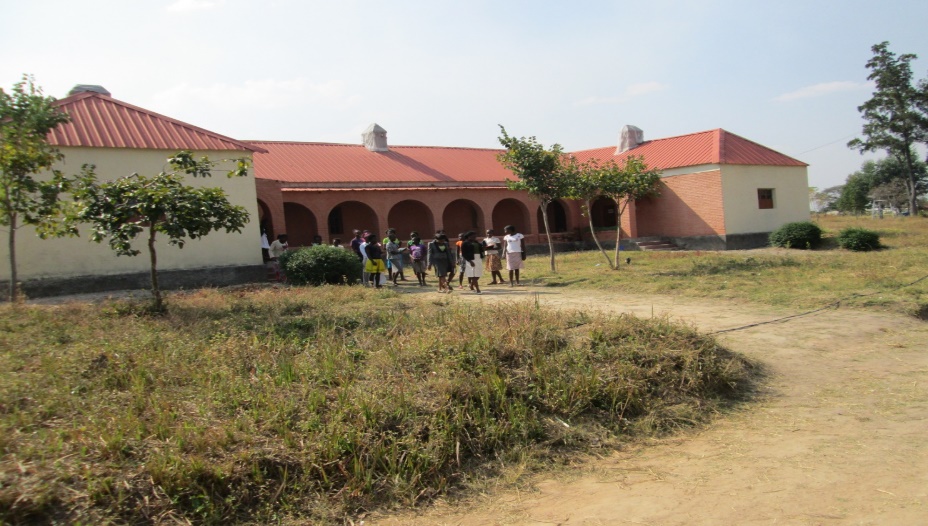 Both the Chilesso School and the Camundango School were successful in leading workshops for parents to understand the importance of education for their children. As a result, 26 new students enrolled in the Chilesso School, of which 15 are young women and 11 are young men. The outcome was also very positive for the Camundongo School, which gained 36 new students; 18 females and 18 males.
Both the Chilesso School and the Camundango School were successful in leading workshops for parents to understand the importance of education for their children. As a result, 26 new students enrolled in the Chilesso School, of which 15 are young women and 11 are young men. The outcome was also very positive for the Camundongo School, which gained 36 new students; 18 females and 18 males.
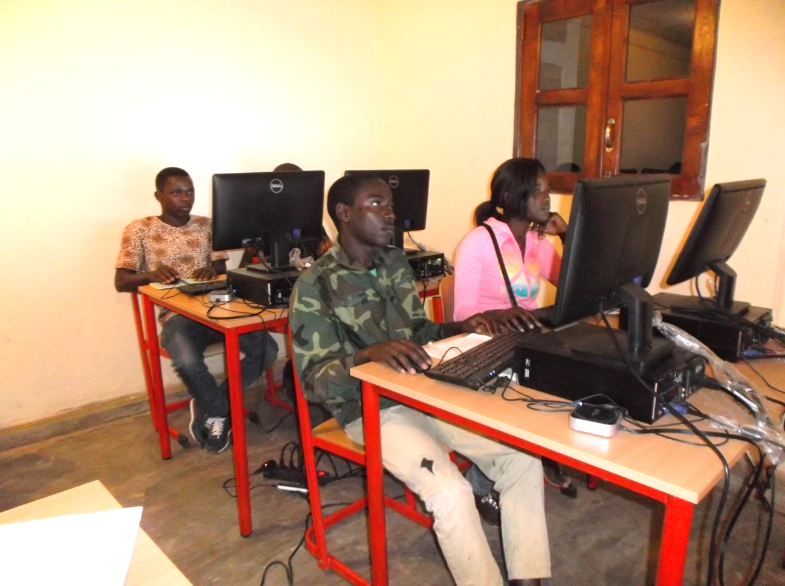 Students started the new semester in school campuses with new renovations. Over the summer, the schools were able to improve the functional ability of both facilities. Walls were patched and repainted, and the electric generators and water systems were replaced with newer and more productive equipment. Additionally, much-needed teaching equipment and learning tools were purchased. The most in-demand items obtained in 2017 included new sewing machines, seeds and tools for agricultural classes, and computers.
Students started the new semester in school campuses with new renovations. Over the summer, the schools were able to improve the functional ability of both facilities. Walls were patched and repainted, and the electric generators and water systems were replaced with newer and more productive equipment. Additionally, much-needed teaching equipment and learning tools were purchased. The most in-demand items obtained in 2017 included new sewing machines, seeds and tools for agricultural classes, and computers.
In addition to trainings on hygiene, health, Biblical studies, ethics, and home economics, the schools are looking to expand their courses to offer more agricultural workshops for the community. Increasing the reach of agricultural studies would improve accessibility to sustainable food sources, helping to reduce hunger and poverty in local areas.
Another goal for each school is to help students pursue entrepreneurship after graduation. A lack of employment opportunities in Angola has left young people without many post-education options for building their careers. Promoting entrepreneurship would aid students in creating jobs while providing more goods and services to their communities.
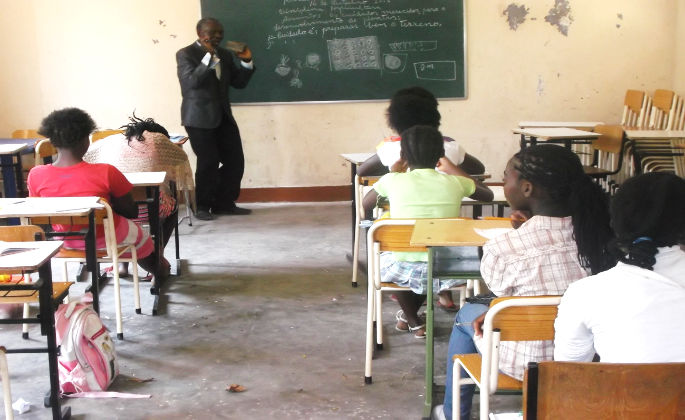 IECA is looking into ways for the schools to become more self-sustainable. A significant portion of financial gifts received in 2017 were used for renovations and repairs, learning equipment, and professor stipends. Covering these expenses plus ongoing operating costs has left the schools with a very small budget for future needs.
IECA is looking into ways for the schools to become more self-sustainable. A significant portion of financial gifts received in 2017 were used for renovations and repairs, learning equipment, and professor stipends. Covering these expenses plus ongoing operating costs has left the schools with a very small budget for future needs.
Update: March 2021
One of the educational priorities of the training centers at the mission stations of Chilesso and Camundongo is training young women to manage their homes and promote sustainability within them. IECA typically trains over 200 young women annually in matters of Cooking, Pastry and Decoration, Cutting and Sewing, Home Management, Hygiene and Health, Agriculture and Bible Studies and encourages women to create small businesses in these areas with the support of Global Ministries through the Dille/Dunbar Fund.
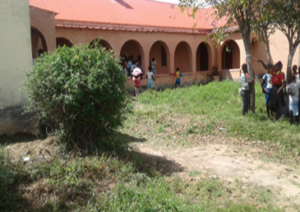
A total of 217 students registered for these classes in 2020 (109 in Chilesso and 108 in Camundongo), however, the classes were interrupted by COVID-19 pandemic. The first cases of COVID-19 were reported in Angola in March and soon after, a state of emergency was declared in the country followed by a lockdown. Sadly, this coincided with the beginning of the academic year and the Chilesso and Camundongo mission stations could not hold classes as planned. In response to the pandemic, IECA focused on providing education on prevention measures and how to deal with COVID-19, including the creation of leaflets with basic information about COVID-19 in the Umbundu language. IECA is placing new precautionary and biosafety measures at the schools in Chilesso and Camundongo for the 2021 academic year so that their classes can safely resume. Currently, IECA will be opening both schools on Monday, April 5, 2021. As the economic effects of COVID-19 and the severe droughts in agricultural regions across Angola have impacted women negatively, and particularly young women, IECA shares that the skills training courses and microcredit projects for women are a priority for the upcoming year and years to come.
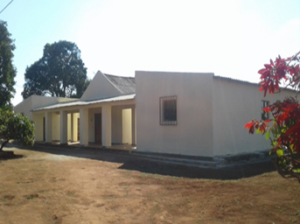
Update: April 2022
In 2021, 76 students were enrolled in courses at the two IECA Schools for Young Angolan Women in the mission stations of Chilesso and Camundongo. There were 42 students studying at the Chilesso mission and 34 students studying at the Camundongo mission. At both schools, there was a teaching faculty of 12 instructors, eight of which were women. The school year included programs on starting income generating projects for women including raising livestock, poultry, sustainable agriculture, pastry making, and sewing.

Gifts received through the Dille/Dunbar fund in 2021 were used to provide for the enrollment fees of women, new training materials and books for the teachers and students, as well as several infrastructure projects. The infrastructure projects completed in the last year include the installation of a new roof made of zinc sheet metal on the female boarding school in Camundongo after it had collapsed amid strong winds. Additionally, both schools were painted completely.
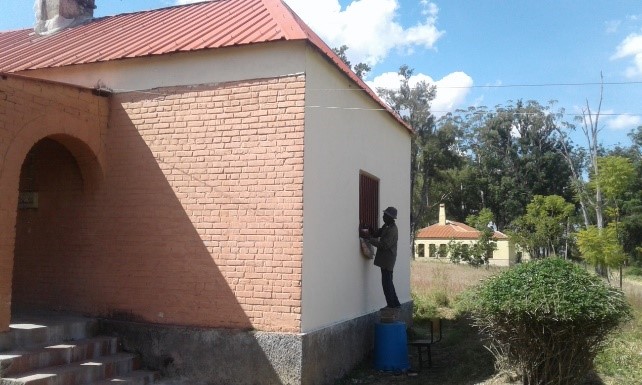
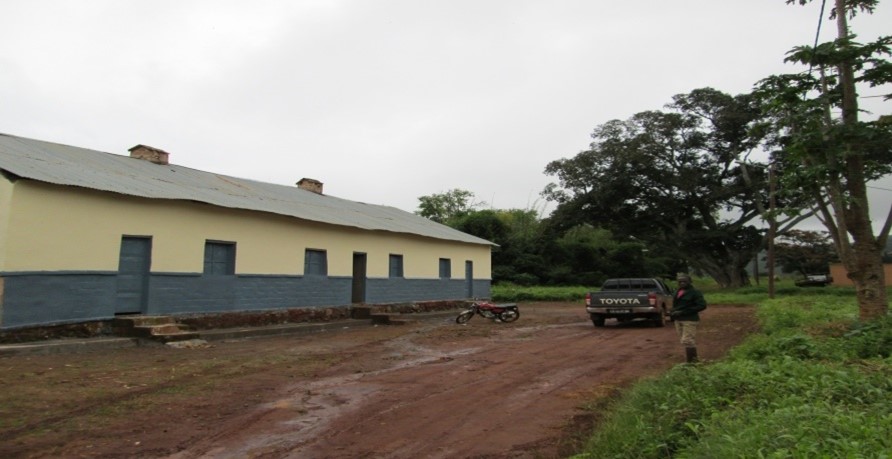
Accessing clean drinking water is becoming an increasing concern. Due to the hand water pumping cranks breaking down recently at both Chilesso and Camundongo schools, women and girls studying at the IECA Schools for Young Angolan Women are walking long distances to obtain clean drinking water. As a whole nation, Angola is facing the worst drought in 40 years and experiencing rising food prices as a result. The mission stations of Chilesso and Camundongo, which are located in the province of Bié, also have suffered the impacts of drought, and the students and families in this area are experiencing a lack of clean water for drinking, cooking food, washing clothes, personal hygiene, and livestock during at least seven months of the year.
To address this vital issue, IECA has created a plan to transform the broken hand water pumps into deep water systems with submersible pumps to be powered by solar panels. The project will provide water for all students and at least 100 families who live in these two regions. As a result, this project will greatly reduce the distances that students and families, particularly girls and women, must travel to retrieve water. For each location, the drilling, parts, and labor costs total $7,500 each or $15,000 in total for installing the new water systems at both Chilesso and Camundongo mission stations and schools. Global Ministries welcomes gifts for the Dille/Dunbar Fund that supports the Evangelical Church in Angola’s Schools for Young Angolan Women.
Update: April 2023
The impact and restrictions imposed to prevent the spread of Covid-19 forced IECA to close boarding schools in the evangelical missions of Chilesso and Kamundongo. In 2022, the schools located at the Kamundongo and Dondi mission stations were fully opened and operating. At this time, IECA is working to reopen the school at the Chilesso mission station.
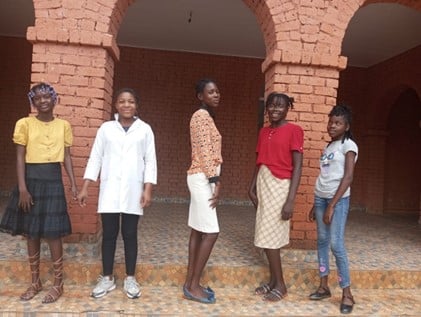
In the current school year, around 35 young women in the Kamundongo Mission Station and 25 in the Chilesso Mission Station will attend courses in cooking, home care and sewing. In addition to the courses, it is planned to buy mattresses and hygiene material for the girls.
Improving rural community access to safe water
From January to December 2022, the IECA set forth to improve rural communities’ access to safe water. They are constructing a water system that will provide safe drinking water to the Kamundongo Mission and surrounding villages of Sachuma, Polim, Candoloma, Festinha, and Ngandavila. This project will benefit more than 50 families with a total of 350 individuals served. IECA plans to establish a garden near the water source to serve as an experimentation field for new gardening techniques. The produce grown will be distributed to the most vulnerable populations in the community and the mission hospital.
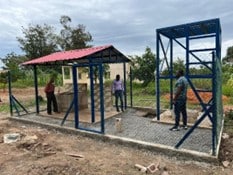
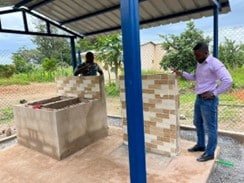
As of mid-February 2023, the water system’s construction is nearly finished. Once completed, IECA will build and train a Water Management Team of ten individuals from the local villages. The team will also host sanitation awareness campaigns for the community.
Kamundongo Mission resident, Joana, shared what this water system will mean to her and the community: “We are very happy that now we shall have safe and clean water close to our dwellings. In the past, women and children had to walk 40-45 minutes to the nearest river. We thank you for helping us.”
Support this Ministry
To make a gift for this ministry online or by check use the online donation page.
- 100% of your gift will be directed to Schools for Angolan Young Women
- You will receive updates on the work in this area as they become available
- Share in the vision of God’s abundant life for all people
Related Content
Global Ministries is Saddened to Learn of the Death of Dr. Gene Johnson
Dr. Gene E. Johnson died April 2, 2025, at age 96 at the Seminary Village, Galesburg, IL. He...
Read MoreReligious Leaders in Sierra Leone Urged to Hold Government Accountable on Public Debt Accumulation and Management
Originally shared here by the All Africa Conference of Churches. The All Africa Conference of...
Read MoreKushe o from Freetown, Sierra Leone
Written by KC King, Global Mission Intern with the Council of Churches of Sierra Leone Kushe o...
Read More
